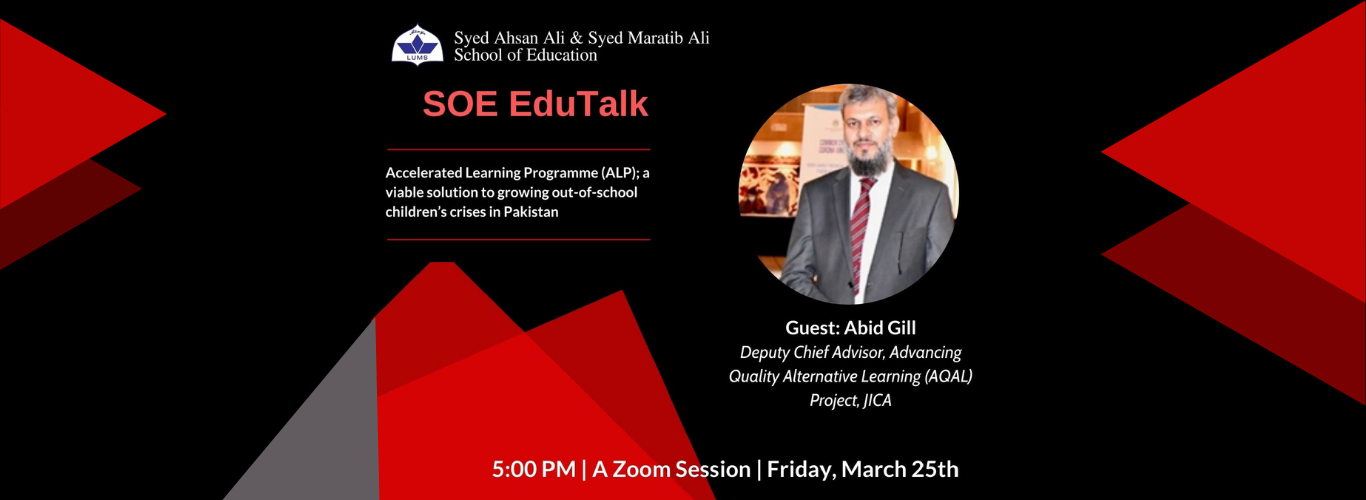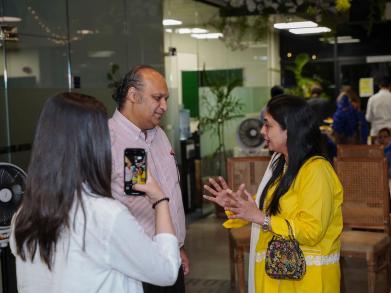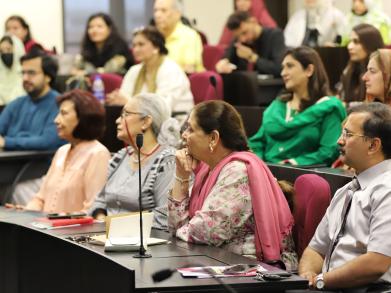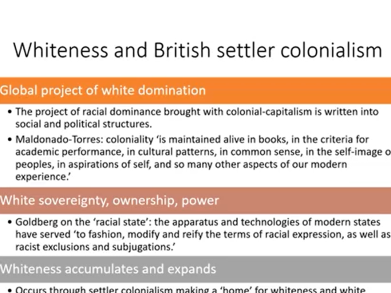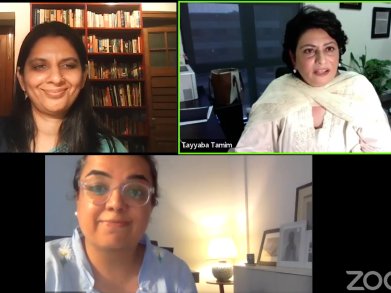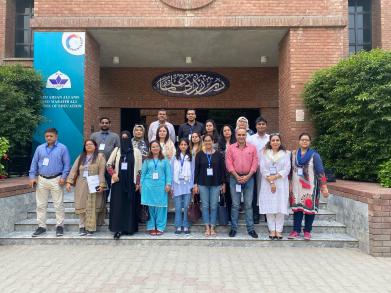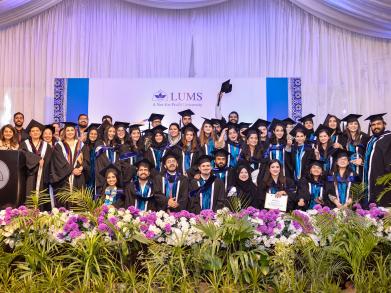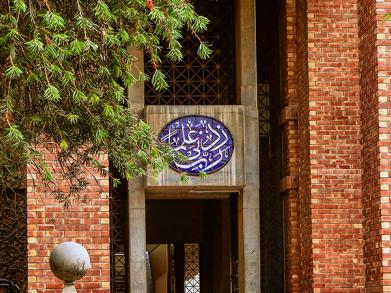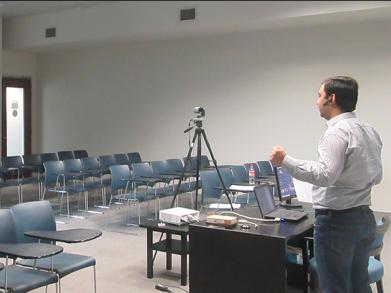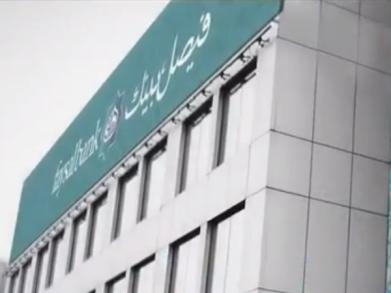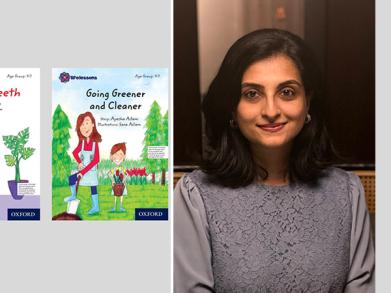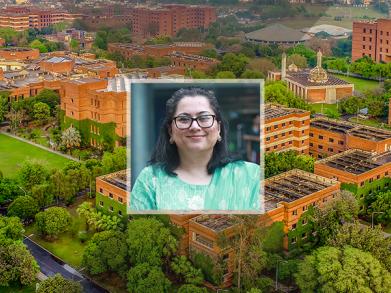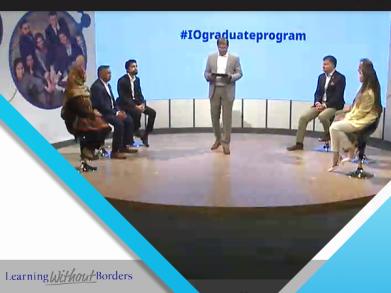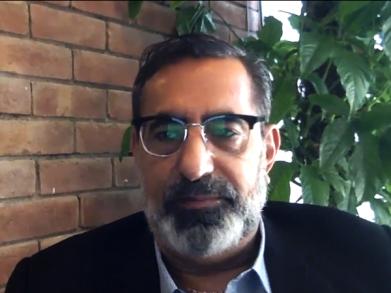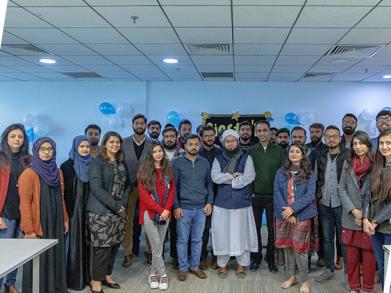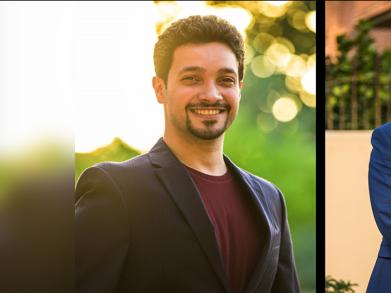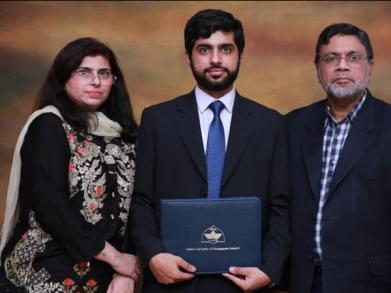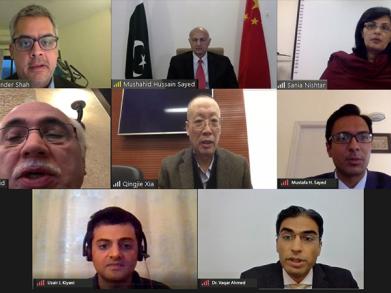Accelerated Learning Programme (ALP); a viable solution to growing out-of-school children’s crises in Pakistan
Dr. Abid Gill was our speaker in the third online session of the EduTalk series of Spring 2022. Dr. Abid Gill spoke about “Accelerated Learning Program (ALP); A Viable Solution to Growing Out-Of-School Children’s Crises in Pakistan” on Friday, March 25, 2022, from 5pm till 6pm. The session was moderated by Dr. Tayyaba Tamim (Director Academics and faculty) & Dr. Razia Sadik (faculty) from Syed Ahsan Ali and Syed Maratib Ali School of Education, LUMS.
Dr. Abid Gill is currently working as the Deputy Chief Advisor, Advancing Quality Alternative Learning (AQAL) Project at JICA. He has successfully led the education reforms process in association with the authorities of Punjab, Sindh, Baluchistan, and Federal Government that resulted in development and approval of Non-Formal Education Policies, quality assurance & enhancement through standards, curriculums, and their management. He has over 22 years of experience in social development sector in the field of education. He has worked with the national and international organizations including UNICEF, UNESCO and JICA in management and advisory capacities.
Accelerated Learning Program (ALP); a viable solution to growing out-of-school children’s crises in Pakistan
Pakistan Education Statistics Report 2016-17 reveals that 22.8 million children of 5-16 years of age in Pakistan are out-of-schools and 78% of these are between the ages of 10 and 16 years, categorically revealing a fact that the OOSC crises is severe on 10-16 years of age cohort. Another survey conducted by PSLM 2018-19 describes that 32% children of 5-16 years of age are out of schools, of which 5.7% are dropped out, while 26% have never been to schools. Additional research conducted by JICA on exploring reasons of OOSC states that access issues including safety issues and unavailability of schools, taking care of siblings and peer effect were among the most powerful factors that keep girls out of schools. Similarly, academic failure or their inability to understand teaching in the classrooms, peer effect, seeing no value in education, inadequate attention towards homework and poor health status were recorded as key reasons for being out of schools among boys.
The research tried to record views of the boys and girls on suitable learning programs that may suit their situations. Significant number of boys and girls opted for ALPs and blended or skill-integrated ALPs and that the distance learning was opted as the most suitable delivery especially among girls, while a big number of boys and girls opted for digital, and tech based and hybrid delivery strategy in noon and evening shifts.
In addition to the above given situation that describes the OOSC issue and need for an alternative and accelerated learning program, supply of schools is another compelling factor that should be discussed to understand the OOSC crises further. According to Pakistan Education Statistics Report 2017-18 (published in 2020), primary schools in Pakistan are 79%, and middle-elementary schools are only 11% and remaining 10 percent are secondary and higher secondary schools in public education sector. This situation points towards acute scarcity of middle-elementary and secondary schools in the country, which restricts transition of learners to vertical learning cycles, e.g., from primary to middle, and middle to secondary cycles. In such situation where supply side limitations are impacting the OOSC crises especially at middle or secondary levels, ALPs for middle and skill integrated ALPs can offer a viable learning solution to a big number of OOSC. The ALPs that can serve as the best suited learning remedy for OOSC in Pakistan, are equivalent, accelerated, and flexible learning models that are age appropriate and offer learning solution at doorsteps addressing access and safety issues for girls in particular.
So far, JICA’s advancing quality alternative learning (AQAL) project has designed ALPs for primary and middle levels and another ALP that offers skill integrated middle level learning course. The ALP (Primary) offers primary certificate in 30 months, while learners can move across the formal and non-formal schools for learning continuity during and after the course. This program is equivalent to national curriculum 2006 and is also aligned with single national curriculum 2021. This program is adopted by Balochistan, Sindh, Punjab, KP and federal education ministry and being implemented to accommodate overage OOSC who have difficulty in studying in formal schools. In addition to ALP (Primary), ALP (middle and middle-tech) are being designed where learners would have two options under learning continuity to join the grade nine of the formal education or join advanced level skill course in any recognized technical and/or vocational institution.

While explaining the illiteracy issue in South and West Asia, Abid explained that while our country faces the challenge of illiteracy in general, our main challenge is increasing our numbers in Youth Literacy. Moreover, youth with low literacy rate becomes a liability for the nation rather than becoming an asset.

Explaining the education scenario on a macro level, Mr. Abid said that as per our constitution, education is a basic, free, and fundamental right of the nation and our governments should work towards making it more accessible for everyone in the country. Hence, larger portion of the GDP should be assigned to this cause instead of the 2% which is the current allocation.
Learning and Education
As a solution, Mr Abid presents a few alternative options of non-formal learning pathways which, in his opinion, will be highly beneficial for the growth in the literacy rate of the country and tie our goals with the sustainable development goals.
At the moment, non-formal education (NFE) is still not widely practiced in our country but if we adopt it as a proper option of learning alongside the formal education methods, then we can achieve our targets, similar to Indonesia, Bangladesh and Malaysia etc.

In order to understand NFE in the context of overall educational learning process, we understand that formal education is more contextualized and can be managed on our own pace while informal education is a contextualized method of learning. Hence, NFE can be termed as Context Appropriate education on a country-level.

After in-depth research in the literacy factors for out of school children (OOSC) in the context of Pakistan, he discovered that these children face more social issues. Most OOSC belong from remote areas with less development in their surroundings, some come from disaster-stricken areas, some are refugees, and some are state-less children, who are not in the school and most female children do not go to schools after they reach a certain age. Overall, there is lack of security and transportation for the OOSC too which hampers their learning process. Parents and children who belong from this poor economic group, education is not their first choice, as they are expected to partake into labour to alleviate their family’s economic conditions. Considering these many factors which keeps the children out of school and their parents helpless in their economic situations, we need to keep the education management system inclusiveness enough so that despite the problems, they’re able to seek education. According to Abid, non-formal education methodology will help them ascertain this goal.
In Abid’s research he interviewed 300,000 OOSC across the country and inquired the children about the education of their parents. It turns out that parents who have either never been to school themselves or are drop-outs, their children were more prone to follow their parents’ lifestyle and be involved in labour than go to school. In such scenarios, the children were more interested in skill or blended learning and training which gives them a basic understanding of various occupations, instead of formal/regular education.
Below are the numbers which he gathered from his study:
|
Never been to schools |
||||
|
Male |
Female |
|||
|
Father |
Mother |
Father |
Mother |
|
|
Non-Literate |
79.4 |
90.5 |
73.4 |
85.1 |
|
Literate |
5.5 |
3.2 |
9.0 |
9.7 |
|
Primary |
8.5 |
4.2 |
7.1 |
2.8 |
|
Middle |
3.0 |
0.8 |
2.8 |
0.8 |
|
Matric |
1.7 |
0.8 |
4.8 |
0.8 |
|
HSS |
1.1 |
0.4 |
2.0 |
0.3 |
|
B. A |
0.8 |
0.0 |
0.8 |
0.6 |
|
M.A |
0.0 |
0.0 |
0.0 |
0.0 |
|
Higher |
0.0 |
0.0 |
0.0 |
0.0 |
|
Drop-out |
||||
|
Male |
Female |
|||
|
Father |
Mother |
Father |
Mother |
|
|
Non-Literate |
60.2 |
77.3 |
50.4 |
64.6 |
|
Literate |
11.3 |
7.1 |
15.7 |
19.2 |
|
Primary |
16.0 |
9.5 |
17.4 |
9.2 |
|
Middle |
5.9 |
2.9 |
10.6 |
3.3 |
|
Matric |
5.7 |
2.9 |
4.8 |
3.3 |
|
HSS |
0.5 |
0.5 |
0.3 |
0.3 |
|
B. A |
0.3 |
0.0 |
0.8 |
0.0 |
|
M.A |
0.0 |
0.0 |
0.0 |
0.0 |
|
Higher |
0.0 |
0.0 |
0.0 |
0.0 |
In terms of modes of education, most children were not interested in the face-to-face learning methods. While, most children are interested in hybrid, digital or tech based, or distance learning programs. Moreover, their preferred timings were either the morning times or the evening classes. This is because their time is flexible according to their labour/occupation which they have already inculcated in their lifestyle, hence making it increasingly difficult for them to opt for formal-education methods.
In these scenarios, Abid came up with certain solutions which will address the OOSC crisis in the country in the form of Accelerated Learning Program (ALP) for Primary and Elementary level children:
- Recognizes prior knowledge and offers strategies to build on to acquire new knowledge and skills,
- Relevant to the needs of the target group,
- Locally suitable and culturally relevant,
- Gender – equitable,
- Flexible timings, duration, course, teaching methods, uniforms etc.,
- Provides age-specific competencies and addresses diversity among learners,
In ALP Primary level:
The target will be to focus on
- Overaged children who can’t be accepted to formal schools,
- Those who have no access to formal schools.
The target goal is for 30 to 32 months of training and give them a certificate which is equivalent to primary level (grade 5).
In terms of future pathways, the education will help them in:
- Mainstreaming to formal schools in course of primary level,
- Continue elementary education after completion of the program,
- Enrollment in vocational training after completion of the program.
The idea is that through this ALP model, the children will be able to get the basic level of education, without spending time in formal education and still be able to catch up to their counterparts studying in the formal education system, as described in the below visual figures.


Similarly, in the ALP Elementary level:
The target will be to focus on
- Primary graduate overaged children,
- Those who have no access to formal schools.
The target goal is for 16 to 18 months of training and give them a certificate which is equivalent to elementary level (grade 8).
In terms of future pathways, the education will help them in:
- Mainstreaming to formal schools in course of secondary level,
- Continue secondary education after completion of the program,
- Enrollment in vocational training after completion of the program.
Luckily, this program has been approved by the Sindh Ministry of Education and will be applicable all the province.
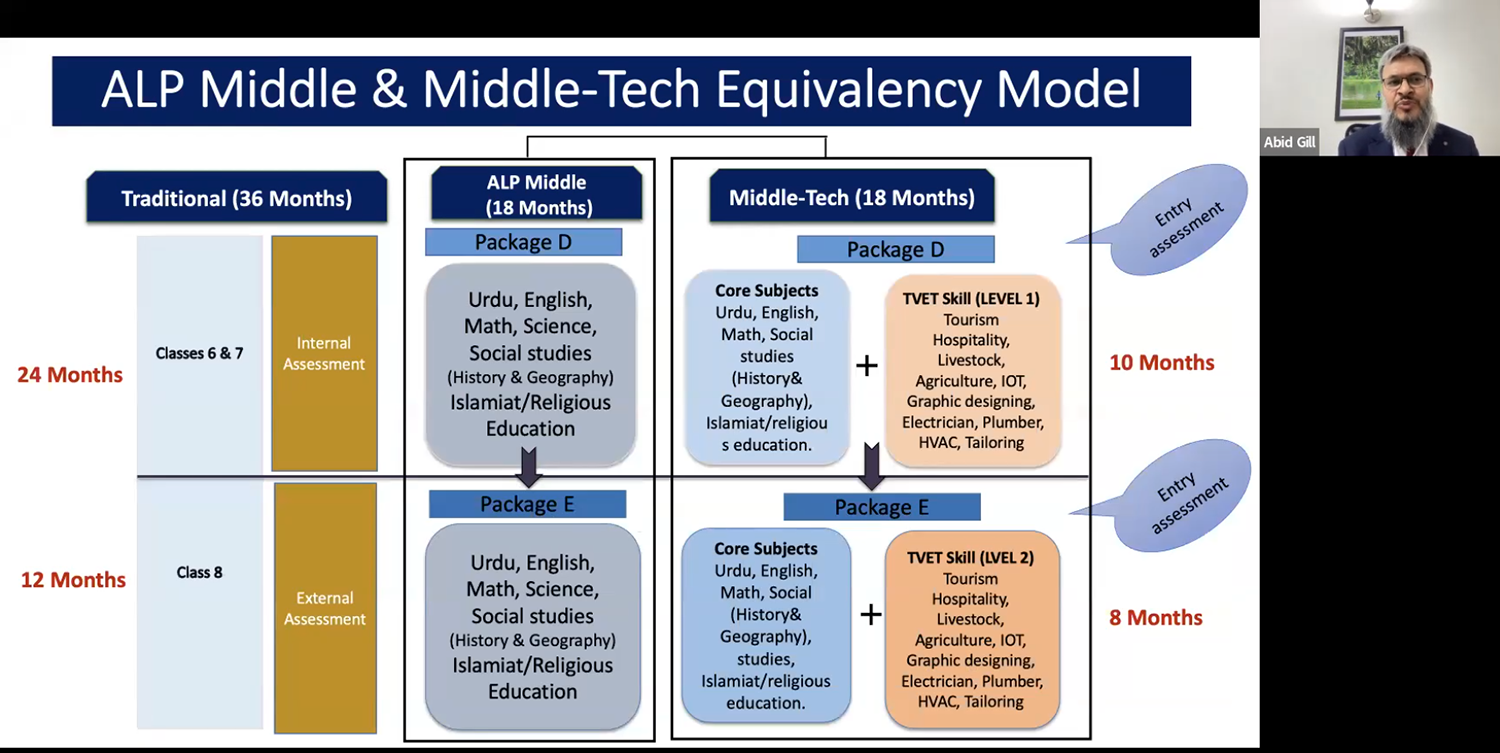
The last and third solution which Abid came up with was for the children who have crossed the age of 16 years, and is called the Integrated Literacy and Skills Program (ILS):
The target will be to focus on
• Age of target beneficially 17 to 24
The target goal is for 6 to 12 months of training and give them a certificate which is equivalent to grade 3 – 5, plus they will be able to equip themselves in the acquisition of trade specific skills and life skill.
In terms of future pathways, the education will help them to:
- Transition to relevant skill/ vocational program in certified vocational institution for advanced training,
- Utilize knowledge and skills in social and economic activities.
Once developed, Abid then worked with the government organizations to make sure that the recognition of these new non-formal education systems was made through the legislation and proper accreditation was given to the programs. He is also working on a NFE Act to give the process a formal and legal backup.
Through these NFE education policies he has developed curriculum, social mobilization, MNE system, data management, equivalency, and data management system for the ALP & ILS program so that this is a viable and practical option for the people to adopt for a better learning outcome.

About Mr Abid Gill:
Abid Gill is the Deputy Chief Advisor, Advancing Quality Alternative Learning (AQAL) Project, JICA
Over 22 years of experience in social development sector in the field of education in particular. Have worked with the national and international organizations including UNICEF, UNESCO and JICA in management and advisory capacities. Currently working with JICA as Deputy Chief Advisor of the “Advancing Quality Alternative Learning” (AQAL) project and successfully led the reforms process with Punjab, Sindh, Baluchistan, and Federal Government that resulted in development and approval of Non-Formal Education Policies, quality assurance & enhancement through standards, curriculums, and their management.
About Dr. Tayyaba Tamim:
Dr. Tayyaba Tamim is currently an Associate Professor and the Director of Academics at the Syed Ahsan Ali and Syed Maratib Ali School of Education, Lahore University of Management Sciences. She is the Faculty Lead of the Pedagogical Partnership Program at the LUMS Learning Institute. She has her PhD from University of Cambridge as a fully funded RECOUP scholar and MPhil RSLE (Research in Second Language Education Across Cultures) from Cambridge, UK as a British Council Chevening scholar. Dr. Tamim has led several funded research projects with national and international partners, including with USAID, British Council, and the World Bank. She has also published and presented research papers at several national and international forums. Her work covers issues of social justice, equity, and inclusivity in education.
About EduTalk:
EduTalk is an exclusive series of guest speaker sessions by the School of Education (SOE) at LUMS, where various topics in educational research field are discussed by seasoned professional from across the globe.




